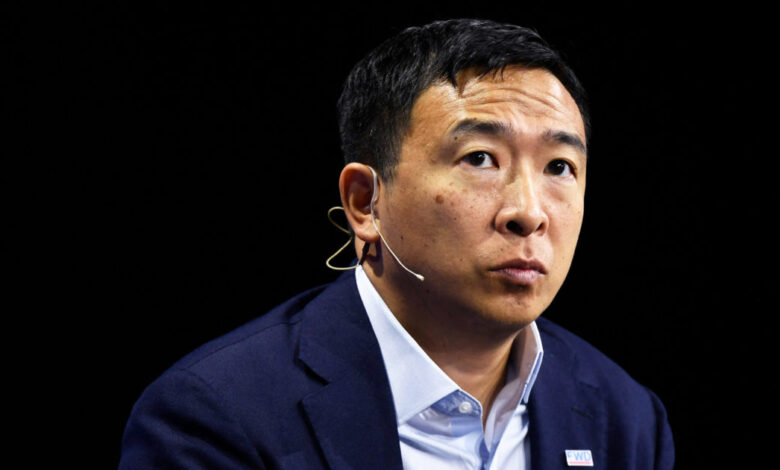Andrew Yang’s New Novel Predicts Electoral Chaos

Entrepreneur Andrew Yang ran a surprisingly successful presidential campaign in 2020, captivating the internet with fresh ideas and a fun, geeky persona. More than any other candidate, Yang seemed to channel the optimistic spirit of science fiction shows like Star Trek.
“There are a bunch of things that are happening now that mean we should be thinking more ambitiously about what our society could and should look like, and I ran for president on those ideas,” Yang says in Episode 554 of the Geek’s Guide to the Galaxy podcast. “I’d like to think that I was the presidential candidate that a lot of science fiction and fantasy people would recognize as one of their own.”
Yang, author of the nonfiction books Forward and The War on Normal People, recently released his first novel, The Last Election, about a plot by the Joint Chiefs of Staff to seize power in the wake of a disputed election. “People like stories more than they like anything else, people understand stories better, so I thought, ‘You know what? Maybe we can do this as a narrative,’” Yang says. “It’s meant to be a combination of near-term speculative science fiction/fiction with a lot of real-life details.”
Yang collaborated on the book with Canadian journalist Stephen Marche, author of the nonfiction book The Next Civil War. “When I reached out about this, he snapped it up and saw that it was a great way for him to get some of the research he’d done for The Next Civil War into a book,” Yang says. “He thought that because he knew journalism so well and I knew politics so well, that we’d each bring those to the table.”
The Last Election is marketed as a paranoid political thriller in the vein of Seven Days in May or The Manchurian Candidate, but Yang warns that the scenario it describes is all too plausible. “All the crazy stuff you can imagine happening out there in American politics is more or less happening,” he says. “You have people questioning election results, you have riots, you have threats of violence. You have a majority of the American people who don’t know who to trust and don’t know where to turn. So could you have an election where literally people are refusing to acknowledge that the other side won as quickly as 2024? Sure. In a way we’re already experiencing versions of that.”
Listen to the complete interview with Andrew Yang in Episode 554 of Geek’s Guide to the Galaxy (above). And check out some highlights from the discussion below.
Andrew Yang on Dungeons & Dragons:
When I became an entrepreneur I used to joke that it was because I played Dungeons & Dragons, because I always dreamed of going into the woods and killing the dragon, not being a scribe, which is what I thought my corporate job was like. … We went through the canon of basic D&D at the time, so it was Keep on the Borderlands and on up from there. The Isle of Dread, Castle Amber—which was way too hard, everyone dies. It’s very good though. Master of the Desert Nomads, Temple of Death. Saga of the Shadow Lord I believe we played. I’m looking at the dates on these things now. It’s ’81, ’83, ’84. It was around that period. Those were the major modules that formed my childhood.
Andrew Yang on Star Wars: Episode IX—The Rise of Skywalker:
We had about a half a million donors to the campaign, and so we said, “Hey, let’s just bring some donors to this premiere of a movie that I want to see anyway.” My team was really clever, because they knew integrating things that I would enjoy doing would make me happier and more energized. People can sense when you’re bullshitting and sense when you actually like something. So it was obviously something I was excited about, to go see the Star Wars movie, and some donors were excited too, so we went and saw it. … I did the [presidential] debate in southern California and then went straight to a late-late showing. It was fun.
Andrew Yang on universal basic income:
One reason why I think my campaign was so interesting to people is because it wasn’t born of an interest group. It was born of a desire to improve people’s lives, and then it cribbed from things that just happened to influence me, and science fiction and fantasy was certainly one of those major influences. But also facts. I mean, when I talk about AI and UBI [universal basic income], this stuff is going to happen, so let’s not present it as if it’s science fiction. … AI being real speeds us up in some ways because people look at it and say, “Hey, I’m actually concerned about that. It could even affect me.” So I think [UBI] is closer in terms of time, but the path there is still very fraught.
Andrew Yang on the Forward podcast:
I came off the presidential trail and said, “OK, how are we going to make this stuff happen in real life?” And then I started a podcast—Mark Cuban and Jack Dorsey I think were a couple of the first guests—just trying to make all of these good things happen. … A recent one that people would probably dig is Walter Isaacson talking about his Elon Musk biography. Because if there’s one person who’s pushed our use of technology forward, it’s probably Elon. And reading that book, holy crap did I learn a lot, so interviewing Walter was fun. That’s an example of something I was really gratified by, because getting to talk to Elon’s biographer was really remarkable.




